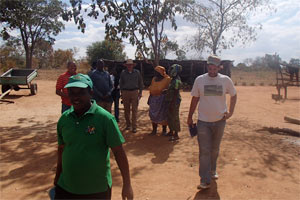
While it is now widely acknowledged that a smallholder-based, agro-ecological food production system is the best way to eradicate hunger and to reduce the impact of agriculture on climate change, less attention is given to the role that farmers play in sharing the lessons they have learned. Building on a farmer-to-farmer approach, the Zimbabwe Organic Smallholder Farmers Forum (ZIMSOFF) is interested in training community facilitators and trainers, helping them develop a horizontal and participatory learning system.
A member of the Eastern and Southern Africa Smallholder Farmers’ Forum (ESAFF) and of La Via Campesina, ZIMSOFF was founded in 2002 during the World Summit on Sustainable Development held in Johannesburg, South Africa. ZIMSOFF is an organisation of small-scale farmers, in which all the positions of responsibility are held by farmers. Its vision is to improve the livelihoods of small-scale farmers and empower them to defend their rights.
A total of 19,000 families are currently members, organised in four regional clusters, covering the whole country except the regions of Harare and Bulawayo. Households in each region are organised as a group; a number of these form a Smallholder Farmers Organisation (SFO), and several SFOs form a cluster.
During the past ten years, and with the support of the PELUM network (Participatory Ecological Land Use Management), we have been building and implementing basic training infrastructure and facilities in these four clusters. Members have organised and held farmer-to-farmer “look and learn” visits, group meetings and workshops, together with seed fairs and other exchange meetings. These gatherings have been an important way of exchanging knowledge and information.
Farmer to farmer, community to community
One of the SFOs in the central cluster is the Shashe Endogenous Development Organisation. Based at the Masvingo Rural District Council, this group started working together in 2000 as an agro-ecological community where members of other communities could visit, spend a few days, and learn from the practices of the local farmers – especially focusing on seeds, soil and water conservation, integrated livestock management, and the local efforts to link producers and consumers.
Shashe was formed by formerly landless peasants who engaged in a two-year land occupation before being awarded the land by the government’s land reform programme. As in the other clusters, the Shashe Endogenous Development Organisation is particularly interested in training other farmers and enhancing a community-based and horizontal learning system. Hundreds of families are “connected”, sharing the knowledge gained from their own experience.
The first meeting of agro-ecology trainers in Africa, organised by La Via Campesina and held at Shashe in June 2011, proposed the development of a training mechanism for “peasant activists and promoters”. Since then, the aim has been to train future trainers (as promoters or facilitators) for a farmer-to-farmer programme. Funding was secured from the New Field Foundation to develop an agro-ecological school, following a similar approach to those already seen in Mozambique, Mali and Niger. Specially targeting young people and women, the Shashe Agro-Ecology School invites farmers from the local community to complete a training course on agro-ecology and sustainable agriculture, integrated land use design and participatory methodologies.
The training follows a syllabus designed by PELUM, building on the “Learning Agricultures” modules prepared by ILEIA (see p. 42), and focusing in particular on those practices that are more resilient to severe climate events (droughts, storms, floods, etc.), more adaptive to a warming climate (genetically diverse seeds, shade trees, mulch and cover crops, water harvesting and conservation, etc.) and which keep carbon in the soil (i.e. the incorporation of organic matter into the soil).
Our overall objective is to add value to or strengthen the existing farmer-led processes with a local team of community facilitators or promoters who act as catalysts. Their role is to showcase those practices that lead to seed and food sovereignty and, working closely with the local government extension officers, to try to influence policy-makers. It is envisaged that the school will train several hundred of such catalysts in any given year.
Methods and lessons
Our objective is to work with all farmers, and together develop the knowledge and skills that will allow them to remain in their communities and work towards their transformation. The school aims to be registered with the Ministry of Higher and Tertiary Education, to be recognised with a National Foundation Certificate, and to link itself to the Great Zimbabwe University, thus providing space for university students. The current lecturers are farmers living close to the school who have been selected by the community because of their skills and expertise. The smallholder farmer plots are being turned into “centres of excellence” on agro-ecology and sustainable agriculture.
Our experience is showing that the most successful tool for promoting farmer innovation is a community-facilitated farmer-to-farmer methodology. This horizontal communication process leads to sharing and learning between innovators (those who have developed solutions to common problems) and their peers. Farmers are more likely to believe and emulate a fellow farmer who is successfully trying a new approach on his or her own farm than to take the word of an agronomist of possibly urban origin. This, even more so, when they can visit the farm of their peer and see with their own eyes the difficulties faced, the steps taken and the results achieved.
Many answers lie in farmers’ fields and knowledge. The Shashe Agroecology School is showing the benefits of farmers playing a key role in the process of sharing these lessons.
